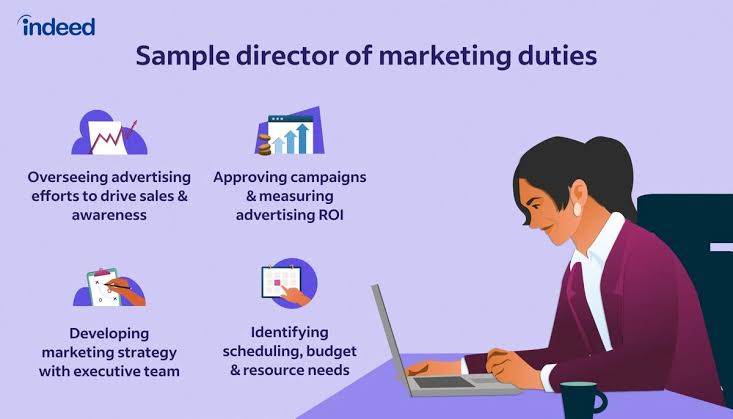Startup marketing job description is a challenging yet exciting field that offers tremendous opportunities for growth and innovation. Marketing professionals in startups are responsible for shaping the brand, driving customer acquisition, and fueling growth through creative and resourceful strategies.
By understanding the key responsibilities and skills required for a startup marketing role, both job seekers and hiring managers can ensure a successful match and contribute to the growth and success of a startup venture. In this article, we will explore the key responsibilities and skills required for a startup marketing role.
Overview of Startup Marketing
Startup marketing differs from traditional marketing in several ways. Startups often operate with limited budgets and resources, requiring marketers to be highly adaptable and innovative.
The marketing team in a startup is usually small, which means individuals are expected to handle multiple roles and responsibilities. The primary goal of startup marketing is to create awareness, generate leads, and facilitate customer acquisition to fuel growth.
Key Responsibilities
Brand Development: Marketing professionals in startups play a crucial role in developing and establishing the brand identity. This involves crafting the brand’s positioning, messaging, and visual elements to differentiate the startup from competitors and resonate with the target audience.
Digital Marketing Strategy: Startups heavily rely on digital channels to reach their audience. Marketing professionals should develop and execute comprehensive digital marketing strategies that encompass website optimization, content marketing, social media management, search engine marketing (SEM), email marketing, and other relevant channels.
Content Creation: Generating compelling and engaging content is essential for startup marketing success. Marketers should create a range of content types, including blog posts, articles, videos, infographics, and social media updates. The content should align with the brand’s messaging, address customer pain points, and drive engagement.
Lead Generation and Conversion: Startups depend on acquiring a steady stream of leads and converting them into customers. Marketing professionals must implement lead generation strategies through various channels, such as content marketing, paid advertising, lead magnets, and events. They should also optimize conversion funnels, conduct A/B testing, and continually refine strategies to maximize conversion rates.
Data Analysis and Reporting: Analytics play a crucial role in startup marketing. Marketers should leverage data to track campaign performance, measure key metrics, and identify areas for improvement. The ability to analyze data from various sources, such as Google Analytics, CRM systems, and marketing automation platforms, is essential for making data-driven decisions.
Growth Hacking: Startups often embrace growth hacking, a mindset that focuses on finding unconventional and cost-effective ways to drive rapid growth. Marketing professionals should possess a growth mindset, be willing to experiment with new tactics, and continually optimize marketing strategies to achieve scalable growth.
Skills and Qualifications
Strong understanding of digital marketing channels, including SEO, SEM, content marketing, social media, and email marketing.
Proficiency in marketing automation tools, CRM systems, and web analytics platforms.
Excellent communication and copywriting skills to create compelling content and messaging.
Analytical mindset with the ability to interpret data and make data-driven decisions.
Creativity and the ability to think outside the box to develop innovative marketing campaigns.
Ability to work in a fast-paced, dynamic environment and manage multiple projects simultaneously.
Passion for startups, entrepreneurship, and staying up-to-date with industry trends.
In the fast-paced and ever-evolving world of startups, effective marketing is crucial for success. Startups rely on marketing professionals to build brand awareness, attract customers, and drive growth. If you are considering a career in startup marketing or looking to hire a marketing professional for your startup, understanding the job description is vital.
Read Also: Navigating Startup Marketing Budget
Startup Marketing Specialist

Startup marketing specialists play a critical role in driving growth and success. Their duties encompass a wide range of responsibilities, including developing marketing strategies, establishing a strong brand presence, creating and distributing engaging content, leveraging digital marketing channels, analyzing data, building relationships, and staying updated on industry trends.
By excelling in these areas, a marketing specialist can contribute significantly to the long-term success of a startup by attracting customers, increasing brand visibility and loyalty, and maximizing revenue generation.
Developing Marketing Strategies: One of the primary responsibilities of a startup marketing specialist is to devise comprehensive marketing strategies tailored to the specific needs and goals of the company.
This involves conducting market research, analyzing target audiences, and identifying key competitors. By understanding the market landscape and customer preferences, the marketing specialist can create effective strategies that differentiate the startup and attract the right audience.
Branding and Positioning: Establishing a strong brand presence is vital for startups, and the marketing specialist plays a crucial role in building and maintaining the brand image.
This includes developing a compelling brand story, designing a unique visual identity, and defining the brand’s core values and messaging. The specialist must ensure consistency across all marketing channels and materials, fostering brand recognition and differentiation in a crowded marketplace.
Content Creation and Marketing: Content marketing is an essential component of any startup’s marketing strategy. The marketing specialist is responsible for creating and distributing valuable and engaging content to attract, educate, and nurture leads.
This can include blog posts, social media content, videos, infographics, and more. By crafting compelling content that resonates with the target audience, the specialist can increase brand awareness, establish thought leadership, and drive customer engagement.
Digital Marketing and Online Advertising: In the digital age, startups rely heavily on digital marketing channels to reach their target audience effectively.
The marketing specialist should have a deep understanding of various online platforms and advertising techniques, such as search engine optimization (SEO), pay-per-click (PPC) advertising, social media marketing, email marketing, and influencer collaborations. By leveraging these channels effectively, the specialist can drive website traffic, generate leads, and increase conversions.
Analyzing Data and Measuring Performance
Data analysis and performance measurement are critical for assessing the effectiveness of marketing efforts and making informed decisions.
The marketing specialist should be adept at tracking key performance indicators (KPIs), such as website traffic, conversion rates, customer acquisition costs, and return on investment (ROI). By analyzing data, identifying trends, and making data-driven optimizations, the specialist can continually improve marketing strategies and maximize results.
Building and Managing Relationships: Collaboration and relationship-building are essential for startup success. The marketing specialist must liaise with various stakeholders, both internal and external, such as the sales team, designers, developers, vendors, and industry influencers. Building strong relationships allows for seamless collaboration, effective campaign execution, and the leveraging of external expertise to further enhance marketing initiatives.
Staying Updated on Marketing Trends: The marketing landscape is ever-evolving, with new technologies, platforms, and trends emerging regularly. A startup marketing specialist should stay abreast of the latest developments and industry best practices.
By continuously learning and experimenting with new marketing strategies and tools, the specialist can ensure the startup remains competitive and innovative in its approach.
In the fast-paced and competitive world of startups, effective marketing plays a vital role in driving growth, acquiring customers, and achieving long-term success.
A startup marketing specialist is a crucial member of the team, responsible for creating and implementing strategic marketing initiatives to promote the brand, generate leads, and maximize customer engagement.
Startup Marketing Analyst
In the ever-evolving world of startups, gaining a competitive edge is essential for success. To achieve this, startups rely on insightful data analysis and strategic marketing decisions. Enter the role of a startup marketing analyst, a key player in unlocking data-driven growth opportunities.
Data Analysis and Reporting: One of the primary responsibilities of a startup marketing analyst is to analyze and interpret data. They collect and assess various marketing metrics, such as customer acquisition costs, conversion rates, website traffic, and social media engagement.
By diving deep into the data, they identify patterns, trends, and insights that can shape the marketing strategy. These professionals are skilled in using analytical tools and technologies to extract meaningful information from the vast amount of data available.
Market Research: To formulate effective marketing strategies, startup marketing analysts conduct extensive market research. They study target audiences, competitors, and industry trends to identify potential opportunities and threats.
By analyzing customer preferences, behavior, and market gaps, they assist in creating a solid foundation for marketing campaigns. This research helps startups understand their customers better and tailor their offerings to meet their needs, ultimately driving business growth.
Strategy Development: Based on their analysis and research, startup marketing analysts play a crucial role in developing marketing strategies. They collaborate with the marketing team and other stakeholders to define marketing objectives, positioning, and messaging.
By aligning the data-driven insights with business goals, they create comprehensive marketing plans that outline the steps to be taken to achieve success. These plans often include digital marketing strategies, content creation, advertising campaigns, and social media initiatives.
Campaign Optimization: Once marketing campaigns are implemented, startup marketing analysts monitor their performance closely. They measure the effectiveness of campaigns using key performance indicators (KPIs) and metrics, such as click-through rates, conversion rates, and return on investment (ROI).
By analyzing these metrics, they identify areas for improvement and optimize campaigns accordingly. They may make data-driven adjustments to targeting, messaging, or channels to enhance campaign performance and drive better results.
A/B Testing and Experimentation: Startup marketing analysts are responsible for conducting A/B testing and experimentation to identify the most effective marketing strategies. By testing different variations of marketing elements, such as headlines, visuals, calls-to-action, or landing page layouts, they can determine which options yield better results. This data-driven approach helps optimize marketing efforts, refine messaging, and improve conversion rates.
Performance Monitoring and Reporting: Regular monitoring and reporting are essential for tracking the progress and impact of marketing initiatives. Startup marketing analysts provide ongoing reports to stakeholders, highlighting key metrics, trends, and insights.
They communicate the results of their analysis, detailing the success of marketing campaigns and the return on investment. By presenting actionable recommendations, they help decision-makers make informed choices to drive future marketing efforts.
Competitive Analysis: Startup marketing analysts keep a close eye on the competition. They analyze competitors’ marketing strategies, tactics, and positioning to identify areas of opportunity or differentiation.
This knowledge helps startups stay ahead of the curve and respond effectively to market dynamics. By understanding the competitive landscape, they can refine their marketing efforts and create unique value propositions.
The role of a startup marketing analyst is multifaceted and critical to a company’s growth. Through data analysis, market research, strategy development, campaign optimization, A/B testing, and competitive analysis, these professionals uncover insights that drive data-driven decision-making.
By harnessing the power of data, startup marketing analysts play a pivotal role in shaping successful marketing campaigns and propelling startups to new heights of success.
Read Also: How to start a business in bitlife
Startup Marketing Lead Role

In the dynamic and competitive landscape of the startup world, effective marketing is crucial for a company’s growth and success. While startups often face numerous challenges, having a skilled and experienced marketing lead can make all the difference.
Strategic Planning and Execution: A startup marketing lead is responsible for developing and executing a comprehensive marketing strategy aligned with the company’s overall goals and objectives. They analyze market trends, customer behavior, and competitor strategies to identify target audiences, define value propositions, and position the startup effectively.
By outlining the marketing roadmap, setting clear objectives, and implementing measurable tactics, the marketing lead ensures the startup’s marketing efforts are focused and effective.
Brand Development and Management: Building a strong and recognizable brand is critical for any startup. The marketing lead plays a pivotal role in defining the brand’s identity, personality, and value proposition.
They work closely with the founding team to establish a compelling brand story and messaging that resonates with the target market. From designing logos and selecting brand colors to creating brand guidelines, the marketing lead ensures consistency across all marketing channels and touchpoints.
Demand Generation and Lead Acquisition: In a competitive market, startups must generate demand and acquire quality leads to fuel their growth. The marketing lead leverages various channels and tactics such as content marketing, social media, email campaigns, search engine optimization (SEO), and paid advertising to attract and engage the target audience.
They create compelling content, optimize landing pages, and implement lead capture mechanisms to convert website visitors into leads. Moreover, they employ analytics tools and metrics to measure and optimize marketing campaigns for maximum impact.
Product Marketing and Positioning: A startup’s success heavily relies on effectively positioning its products or services in the market. The marketing lead collaborates closely with product managers and the development team to understand the unique value proposition and features of the offerings.
They translate technical jargon into customer-friendly language and develop persuasive product messaging that highlights the benefits and solves pain points. By conducting market research and competitive analysis, the marketing lead identifies key differentiators and develops marketing strategies to effectively position the startup’s offerings.
Customer Relationship Management: Maintaining strong relationships with customers is vital for long-term success. The marketing lead plays a critical role in understanding customer needs, preferences, and feedback.
They gather customer insights through surveys, interviews, and analytics tools, which help shape product development, marketing campaigns, and overall business strategy. By nurturing customer relationships and implementing retention strategies, the marketing lead ensures customer satisfaction and encourages customer loyalty.
In the fast-paced and competitive startup ecosystem, the role of a marketing lead is indispensable. From strategic planning and brand development to demand generation and customer relationship management, their responsibilities are multi-faceted and influential in driving a startup’s success.
A skilled marketing lead possesses a combination of strategic thinking, creativity, analytical acumen, and a deep understanding of the target market. By effectively executing marketing initiatives, they not only increase brand visibility and generate leads but also shape the overall direction and growth of the startup.
Read Also: Significance and Uses of Rose Bears
